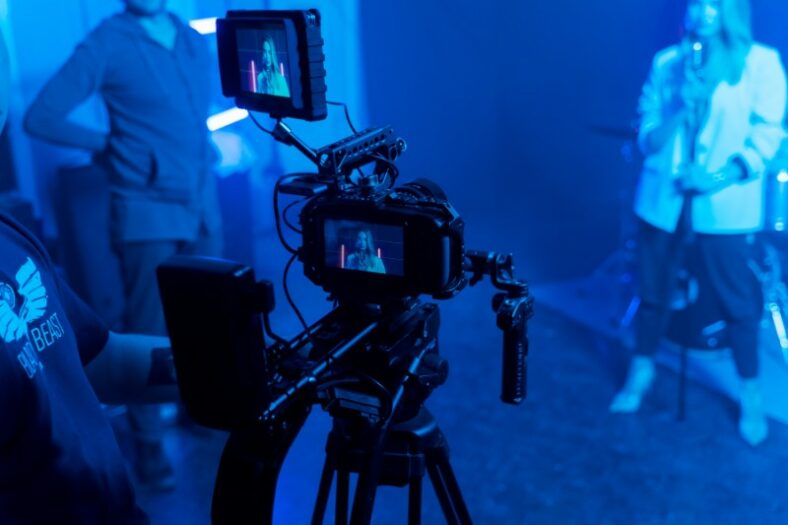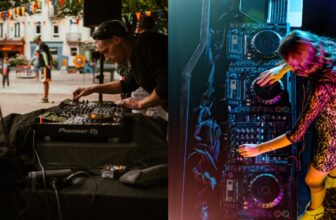20 Things You Need To Know To Start Your Music Career

Building a music career can be an exciting prospect. You can make a living from something you’re passionate about. However, it certainly requires plenty of dedication, hard work, and determination.
These are 20 essential things to keep in mind if you’re getting serious about a career in music.
Contents
- 1. Set Clear Goals
- 2. Work Out Your Living Expenses
- 3. Start With GREAT Music and Keep Improving Your Skills
- 4. Create An Online Presence
- 5. Build A Mailing List
- 6. Build A Network Of Contacts
- 7. Independent or Record Label
- 8. Think Long Term, Get Ready To Hustle
- 9. Monetize And Stream Your Music
- 10. Know About Performance And Publishing Rights
- 11. Start Building a Team Early
- 12. Improve Your Live Show
- 13. Have A Business Mindset
- 14. Make Great Videos
- 15. Work On Release Strategies
- 16. Have A Professional Press Kit With Appropriate Photos
- 17. Band Or Solo Artist
- 18. Finding The Most Authentic ‘YOU’
- 19. Confidence Is Key
- 20. Explore All Possible Music Careers
- Summary
1. Set Clear Goals

One of the first things you need to do is narrow down what kind of music you are drawn to, and what kind of music you can play or write best. Do you want to be a singer? Do you want to be a singer who writes your own music? Do you prefer playing instruments? Are you drawn to music production more than performance?
These are some of the basic questions you need to mull over. Remember, there is no wrong answer. You need to choose what you think would fit you best. Understanding what you are good at is the first step.
Now that you know what you want to do, the next thing to consider is if you want to do it by yourself or if you want to involve other people. If you are comfortable working with others, get a hold of friends or acquaintances you can jam with. You do not have to take yourself seriously at first.
The idea is to find people you vibe with. Start playing music, any kind of music together and build a comfort level with each other. All great bands start out of a garage somewhere, much to the annoyance of their neighbors. Keep practicing till you start to sound like you might be onto something. The key to a great band is in the chemistry that all the members share.
A lot of musicians, when they begin their journey, struggle to find a genre of music they want to play. Play what you enjoy. It is only then that your audience will be able to relate to you.
Once you find your groove, you need to decide if you want to write and play your music or if you prefer working on covers by other artists. Most professional musicians will tell you that even if you play your songs, it is important to practice songs by other artists.
Picking up covers will not only enhance your skills but also help you understand what goes into making a song. Whether you are a singer, guitarist, drummer, or producer, covering other artists will change the way you hear music and this will help you perform better.
It is important to set goals and targets. Set short-term goals such as ‘Play a gig at XYZ venue’ or ‘Record 4 tracks for an EP by X date’. This will keep you focused and productive. Additionally, you should also have some long-term aspirations and dreams. When you set long-term dreams, you will find it easier to proceed toward them and make better choices.
2. Work Out Your Living Expenses
Being a musician is expensive. Even if your cost of living is relatively low, you will constantly need to make upgrades and changes to your gear. This can be difficult without an initial day job.
The first thing you should do is chalk out your expenses and see how much money you need to survive. Professional musicians often forgo temporary material luxuries to save money for their dream gear.
If you have a job that pays your bills, then it is important to instill a good amount of self-discipline. You need to make time for practice. This may mean sacrificing leisure time, but it is absolutely worth it. Finding the balance between work and practice will seem difficult at first, but you will find that it gets easier with time.
Musicians often do not want to stray too far away from the industry when it comes to day jobs. You, too, can find ways to make a living online by doing some of these things.
3. Start With GREAT Music and Keep Improving Your Skills
This may sound like a cliché, but practice really does make perfect. You may be full of talent but that will not get you very far if you do not spend time honing your skills.
Bands need to regularly jam and rehearse to sound tight not just not gigs but to write better music together. If you are a DJ, you still need to work on your transitions and practice them regularly. Instrument players only get better when they practice their rudimentary exercises.
Think of yourself as an athlete. It might feel boring to keep playing the same thing over and over again. But the more time you spend at the beginning of your career, the easier it will be. When you start touring, you will often be unable to find time to practice. You should be able to play your music almost by instinct. Remember that nobody likes to see an artist fumble around on stage!
4. Create An Online Presence
Social media is an important part of our lives these days. As an artist, apart from being a stellar performer to watch live, you must also have a carefully curated online presence that is relatable to your fans.
Create dedicated pages across all social media such as Instagram, TikTok, Facebook, etc. Once you have them up and running, read this guide on how to create a music website where your fans can get access to all your work, your upcoming gigs, and an insight into your creative processes.
WordPress, Squarespace, or Wix are all great options to build a site. Canva is a great online tool for creating images. These are great budget alternatives to buying your domain. Some of them also have templates to help you design your page.
5. Build A Mailing List
Fans always appreciate a personal touch. One of the best ways to involve them is by setting up an email list. You should do this early on and build your base. Paid promotion on social media is expensive. Lists will allow you to communicate directly with your fans and keep them in the loop. Setting up a band email list is easy, you can read our guide and learn how to set one up.
You can use your social media accounts to get people to notice your mailing list. Musicians often give listeners special access to music via mailing lists. You can do exclusive releases of singles or video snippets to get people to sign up.
Chalk out a schedule for your mailing list. You want to keep your fans interested in you but do not go overboard and spam them.
6. Build A Network Of Contacts
All musicians want to be signed to a record label and have a manager who will put things together for them. Before you get there, you must build contacts in the music scene. Fellow musicians, gig promoters, tour managers, etc. are people you should know because you never know what opportunities they may present to you.
Veteran musicians have one pro tip when it comes to building contacts: be nice to everyone you meet. Whether it is the stage tech or the sound engineer at the venue. Remember that it takes a team to make a good gig happen.
An arrogant musician is a lot less likely to succeed than a humble one. Make sure that your behavior leaves a lasting impression on people, in a good way. The way you present yourself will often determine whether you are considered for an opportunity or not.
7. Independent or Record Label
The do-it-yourself method ensures that you have complete control over your music, your shows, and everything else. But this also means that it is a lot of work. You may find yourself answering more emails than writing or practicing music.
If you find yourself overwhelmed by the workload and are making enough money to hire someone, assemble a team that will help you out with your workload. They can be in charge of essential but seemingly inane things such as hotel bookings or travel itineraries. Remember that it is a lot of work, but then again, nothing good in life comes easy.
If you feel like administrative work is taking a toll on you and you aren’t spending enough time on your craft, look for record labels that are willing to sign you on as an artist. Be careful when choosing a label. Read the fine print if you are offered a contract.
Being signed to a label often means that you will have to compromise on a lot of things. You will no longer have a say in a lot of the decision-making about your music and your image. Do not blindly jump into a record deal, spend time researching and approaching labels whose philosophies align with yours.
A lot of smaller labels are often easier to work with because their rosters are small and they tend to give their artists a lot more attention than major ones who have celebrities on their rosters.
8. Think Long Term, Get Ready To Hustle
What is your idea of success? How hard are you willing to hustle to achieve it? Just like setting goals, it is important to ponder over these questions early on in your career. There is no guarantee that you will get booked for gigs or get signed by a record label. Rejection is part of the music business.
Do not get discouraged. Be perseverant and HUSTLE. Madonna would not have been an icon if she did not relentlessly bother DJs at New York clubs to play her music till they succumbed to her requests. Once you set your mind to something, do not stop till you achieve it.
On bad days, remember that failure is a part of life as much success is. Don’t let it get to you, keep your calm and continue to work hard.
9. Monetize And Stream Your Music
Gone are the days of getting distributors to send your vinyl to record shops. In the age of the internet, everyone prefers to stream their music. Your music must be available on streaming sites such as Spotify, Apple Music, Amazon Music, etc.
This is not just for your listeners, but also for booking agents who want to access your music quickly. Services like CDBaby and DistroKid offer attractive packages for musicians looking to upload their music across all streaming sites. You can also use the services of free music distributors (though they take a small cut of your royalties).
If you can get on an editorial playlist by Spotify or Apple Music, then you may see very high streaming numbers for your music. This can result in a lot of exposure for you as an artist.
10. Know About Performance And Publishing Rights
You must have copyright over your music and have your licenses in order when you release something. This will ensure that you get your royalty if your music is being used for commercial purposes. Publishing rights are also important because they safeguard you from plagiarism.
Broadcast Music, Inc. (BMI) is an organization that helps artists with music licensing. If you are a songwriter, you can sign up for free. Individual publishers need to pay $150 and publishing companies are required to pay a fee of $250. You can sign up online and the contract is for 2 years.
The American Society of Composers, Authors, and Publishers (ASCAP) is another agency that distributes royalties to artists who sign up with them. There is an annual contract at a $50 fee for songwriters and publishers to join. Just like BMI, you can sign up online.
BMI and ASCAP are referred to as PRO: Performance Rights Organizations. These agencies are responsible for royalties in the United States. If you are looking to license your music globally, then agencies like SongTrust are better suited for you. There is a signup fee but they are responsible for revenue collection from global giants such as CDBaby and The Orchard. You can sign up with them online.
11. Start Building a Team Early
Even if you are going the DIY route, you need to have a team who will help you with both music and your career.
Producers: If you are not good at making your music, then you will need to find a producer to help write and arrange your music. With bands, a producer often helps in adding a fresh new perspective to the music. Additionally, you will also need mix and master engineers who will make your record sound professional. It is important to find a producer who understands your music and your aesthetic.
Do not work with someone just because they have an amazing portfolio, find someone willing to interpret your ideas and weave magic into your music. If you have the necessary skill sets, then you can do it by yourself. However, remember to get feedback from other producers because their fresh ears will pick up on things you may have missed during the recording or the mixing process.
Managers: Your music manager will act as a liaison between you and the rest of the music industry. Communicate your goals clearly with them and work out a commission that suits you and them. Sometimes managers also double as booking agents.
Promoters, Pluggers, And Agents: Apart from the music team, you will also need to be in touch with booking agents and gig promoters. They are responsible for you getting your gigs and spreading the word about your music to other agents. Just like a manager, make sure they are on the same page as you when it comes to goals and aspirations.
Over time, you will see your team expand. The busier you get, the more you will need help from others. This is completely natural. Over time, your team will become your extended family.
12. Improve Your Live Show
Nobody will pay money to turn up for your shows if they aren’t entertained. Whether you are performing by yourself like Ed Sheeran at Glastonbury in 2017 or you are putting on a show with dancers and an entire horn section. Make sure that every live performance is entertaining.
Don’t save the fireworks just for big events. Even if there are 5 people in your audience, they should leave your gig feeling thoroughly satisfied. Play all kinds of gigs. This will help widen your comfort zone and you will gain an incredible amount of experience.
Be interactive. Figure out if you are a storyteller who can keep the audience enthralled with banter in between songs or an artist who goes through their entire setlist without giving their audience a moment to rest. The more shows you play, the better you will be able to gauge this.
When starting, try to record your performances as much as you can. Not only will this help you create content that you can release later, but this will also help you understand what areas need improvement. It is difficult to be objective about your performance, so take the time out after a gig and assess every gig.
Remember that your audience could have enjoyed your music from the comfort of their homes. Since they have made an effort, so should you. Visual elements such as lighting, backdrops, and even gear make drastic improvements to gigs. Have an aesthetic when it comes to your apparel, don’t let it be random.
13. Have A Business Mindset
While it is difficult to have conversations about money and ownership, it is important to have them early on. All members of your band should be on the same page when it comes to rights and even investments. The same goes for your manager, agent, etc.
If needed, have legal contracts that clearly define roles. All parties need to agree to the terms and conditions. When signing to a record label, make sure you have a lawyer or a legal expert take a look at your contract before you sign anything.
Music is your passion but remember, that at the end of the day, it is also a business. Keep in mind that you are running a business and it isn’t a mere hobby. Be objective about your decisions.
14. Make Great Videos

Just like visuals for a live gig, music videos are important. They ensure that your reach widens. People are drawn to visual things. A great video can make or break your song.
They do not necessarily have to be high budget. Artists often take help from their friends to put a video together. Find people you can collaborate with and those who are willing to work with you. Zero-budget videos often go viral. What is important is how intriguing and captivating they are.
Social media such as Instagram and TikTok have billions of users, so make sure that the content you put out is interesting and keeps the audience engaged. Post regularly and consistently.
15. Work On Release Strategies
Whether you have a single, an album, or a music video. You need to chalk a release plan for it. You can’t just wake up one morning and upload your music to the internet. It will not magically get traction.
Release plans are important. Set deadlines and make sure you stick to them. Artists or their PR teams plan their releases weeks and even months before the release date.
Let your audience know something is up well in advance. You can do this by releasing audio snippets or video promos on your social media announcing the release date. This will create a buzz and keep your audience tuned in.
Do not forget to get your licenses and uploads in order. Waiting till the last moment is not a good idea and many things can go potentially wrong. Think of a release day as an exam, the more prepared you are for it, the better.
16. Have A Professional Press Kit With Appropriate Photos
You do not have to look like a professional model in your photographs for your press pack. But photos are an essential item. It’s the first thing that promoters, agents, and even your fans see, even before they have heard your music.
Make sure your photos represent who you are as an artist. Do not use selfies. If you have photographer friends, ask them if they would like to do a shoot with you. In case you don’t, use a timer on your phone or any other good-quality camera. Let your photos reflect who you are. Have a theme that conveys your music through pictures.
Putting together a press kit or pack is important. Don’t bore people with pages and pages. Keep your artist bio brief, to the point, and engaging. Your technical rider should be clear and practical. Also, unless you are The Rolling Stones, do not make unnecessary demands on your hospitality rider. The easier you are to work with, the more likely you are to get booked for gigs.
17. Band Or Solo Artist
A solo artist does not have to share the spotlight or creative control with anyone else. If you choose to go solo, there are many advantages such as higher profit shares and complete control over your work. But there are many disadvantages as well, you may get lonely and will have a lot more work to do.
A band is like a family. This means that although there is more camaraderie while making music and traveling together, you will find yourself in situations where there are disagreements and confrontations.
Both have their advantages and disadvantages. If you are unsure of what path you should choose, you can read our guide on choosing between going for the option of a band or solo artist to help you make that decision.
18. Finding The Most Authentic ‘YOU’
As the saying goes, “Stand for something, or else you fall for everything.” This holds especially true for musicians. Before you even begin your journey, list your ideals and values. When you progress in your career, you will often find yourself in situations where you will have to compromise on certain things. It is okay to make those choices to get ahead but do not allow yourself to change what you stand for in your pursuit of success.
Stand your ground. Stay true to who you are.
You need to be authentic even at the pinnacle of your career. But what is authenticity in music? Authenticity transcends an artist’s music. It represents all the emotions and experiences that lead to creation.
An audience or a listener can relate to music that comes from the heart. While it is easy to make music only for commercial gain, this is a very short-sighted way of looking at things. You should not do something just because it will sell. Remember that fads come and go, but authenticity stays forever.
19. Confidence Is Key

It is perfectly natural to feel like an imposter at times. Even when you are working the hardest and making or playing the best music, there will be moments when self-doubt creeps in. It is important to not let these negative thoughts take over.
Mental health is a crucial part of your overall well-being. One of the best ways to combat feelings of anxiety and depression is to regularly exercise or play a physical sport. Many musicians practice yoga and meditation to keep their mental health in check.
Fatigue can also be a cause of stress. Try to take your mind off things by taking up a new hobby.
20. Explore All Possible Music Careers
The music industry has a large infrastructure. If you do not enjoy having the spotlight on you at all, then there are many career options you can explore. A good way to find what is right for you is to evaluate what your skill sets are and what you enjoy doing.
Linda Perry is a great example of a musician who wears many hats. The 90s kids may remember her as the vocalist for the band ‘4 Non Blondes’. But what many people do not know is that she is a Grammy-winning songwriter who has written songs for other artists such as Christina Aguilera, Gwen Stefani, Miley Cyrus, Ariana Grande, Alicia Keys, Celine Dion, and many more. If you are good at songwriting, then you might want to consider making a career out of it.
Max Martin, who revolutionized commercial pop music and is credited for the career trajectories of artists such as The Backstreet Boys and Britney Spears, is another great example of a music career away from the spotlight. A music producer, as you may know, is responsible for arranging, composing, and producing music. While you require extensive knowledge in production and music theory to be a good producer, it is a career choice to consider if you do not necessarily see yourself as a singer or instrument player.
The idea is to think out of the box. You can be a studio engineer, stage manager, film music composer, or music teacher… the options are endless.
Find out what you are drawn to and arm yourself with the skills necessary for the job. You do not necessarily have to go to a music school. Work as an intern or a mentee and you will be surprised by how much knowledge and experience you can gain from immersing yourself in a professional music environment.
Summary
A full-time music career is a whole lot of fun. Not many people can boast about how much they love their job. Like anything else, you have to put in a lot of effort and be very determined. You will experience peaks and troughs.
At the end of the day, your trials and tribulations will feel trivial. It’s always worth going after something you are passionate about!





